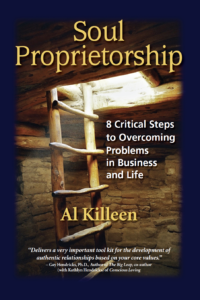As a Consultant that has dedicated himself to the subject of Leadership Development, I have had the good fortune to design, develop and facilitate leadership seminars for Fortune 100 clients around the world, including Europe, Asia and North America. As a result, I am often asked for my opinion on the most important traits or characteristics of a leader. My research and experience always lead me to the following 5 characteristics (in no particular order) –
1. Vision
Creating a vision is probably the most important leadership behavior. It represents the most visible evidence that an individual has something that makes him worthy of being followed. The resulting vision must capture the imagination and energy of those that are being led – in that order. If the leadership vision is compelling enough, then it will capture the imagination of others. If it is not compelling enough, then it will not capture the imagination of others. And for certain, the leader must capture the imagination of others before he will be able to capture their energy.
Unfortunately, capturing someone’s imagination is the low hurdle! Capturing their energy is the high hurdle – the real prize! It is sort of like all the people that you have known in your lifetime that have said that they are fed up with their boss; their co-workers and/or their company, and that they are therefore going to quit their job. Or it is sort of like all the people that you have known in your lifetime that have said that they have a great idea for a business, and intend to drop everything to pursue that dream. In both instances, these individuals have imagined themselves doing something else – they have captured their own imagination – which is the low hurdle. Unfortunately, they have not crossed the high hurdle, which is to gather the energy necessary to move on their ideas and dreams.
The leadership vision must be broad and vivid enough for others to see themselves in it. It must capture the imagination of others, but more importantly it must capture their energy.
2. Passion
The answer to the question “what inspires you?” is the answer to the question “what are you passionate about?” If you cannot readily articulate a passion that you possess, this whole leadership thing is going to be very difficult for you. Of course a person can develop a passion over time. Because passion is something that you feel, and feelings can change according to environment, experience and circumstance, you most certainly can develop a passion.
Notwithstanding the fact that anyone can develop a passion, I continue to be amazed at how many times I have had people shyly look away when I ask them what their passion is. It is curious that so many have a hard time identifying their passion. Michael Hyatt, author of the book Platform: Get Noticed in a Noisy World offers up several reasons why it is that so many have a hard time identifying their passion –
Our insecurities define us more than our hidden, suppressed dreams.
We are afraid to boast.
We see the vastness of the world and feel insignificant or overwhelmed to make a difference.
We feel it’s selfish to become introspective.
We’re extremely busy maintaining an overbooked life and don’t have time to reconsider why we’re working ourselves to death.
We think it’s wrong to do what we love.
We feel the sting of rejection the last time we tried operating in our passion, and we’ve let that rejection scare us.
We are afraid if we identify it, we’ll have to do something, to act on it (and that means risking failure).
In my experience coaching executives, the first and the last items on the list are two of the most common reasons. Interestingly, people view a passive approach to life as being “warm, safe and dry”, and view the pursuit of something bigger as uncomfortable and risky. If this segment accomplishes nothing else, it should disavow you of that notion. Warm, safe and dry is almost never “warm, safe and dry”, and pursuing something bigger is almost always rewarded and characterized by manageable risk. This is particularly the case when the pursuit is as the result of a passion.
Interestingly enough, inspiring oneself so that you can inspire others is really hard work. Staying in a “warm, safe and dry place” is not going to inspire you or anyone else. The reason is quite simple – when we are warm, safe and dry, we lack the passion necessary to lead.
3. Courage
The vision of the leader must also be compelling enough for others to have the faith and courage to invest the time, resources and energy that will be required to actually pursue and accomplish the vision. Merriam-Webster defines courage as “mental or moral strength to venture, persevere, and withstand danger, fear, or difficulty.” Passion is the fuel that enables you to answer the call of leadership when it is appropriate for you to do so. In many instances, passion becomes the source of courage. Not forfeiting the opportunity to lead for lack of courage requires self-awareness – knowing your motivations, preferences, and personality and understanding how these factors influence your judgment, decisions, and interactions with other people and situations. Developing your self-awareness help you to answer the question, what does leadership look like for you? I saw a roadside sign that read – “Courage is being scared to death and saddling up anyway.” Or as Winston Churchill put it, “if you are going through Hell right now, then keep going”.
Pick your battles, but when you time comes, do not forfeit the opportunity to lead for lack of courage. Inspire others with your passion for the vision that you have for future, and they will most surely follow. To borrow an old line from Hillel, the first-century Talmudic scholar – “if not you, then who? If not now, then when?” I love the words of Johann Wolfgang von Goethe – “Whatever you can do, or dream you, begin it. Boldness has genius, power and magic in it.” I live by those words. You should too.
4. Ability to Communicate
If creating a vision is the most important leadership behavior, the ability to communicate that vision is equally important. To communicate as a leader is to be provocative in your communication. As it relates to communicating as a leader, in many ways “we are all just chickens scratching in the dust”. The message to be communicated by this word picture is the fact that when a farmer feeds his chickens, he swings open the gate, sticks his hand in a bucket, and throws out a hand-full of seed. When the seed hits the ground, the chickens immediately begin to peck in the dust to eat the seed. This is descriptive of our feeble attempts to “scratch out” communication in the desperate attempt to be understood by others.
“Scratching out” communication is really hard work. To pick back up our metaphor, it would seem that if the chickens had any sense, they would just jump the farmer and take the entire bucket! That is the opportunity that you have as an aspiring leader. You can be a “chicken scratching in the dust” with your language, or you can be provocative and play a bigger game.
I hope that by the time that you finish this blog, you will be stimulated to dive deeper in your vocabulary. I am hopeful that you will –
Ask for promises, not deliverables;
Instead of talking about corporate ethics, notice the reaction that you get when you use words like deceit and honor.
During your next planning session, talk about the personal courage and sacrifice needed to succeed, rather than just vision and commitment.
Words like promise, deceit, honor, courage, sacrifice, and forgiveness are words that speak to higher human values. We hear and process these words in a profoundly different way than we do common commercial language. When you say these words out loud, process their potency for yourself. They are the provocative words of the leader. Make them your words.
5. Execution
The difference between creativity and innovation is huge. Creativity is the generating of new ideas, of novel approaches, of inventions. In contrast, innovation is the application of creative ideas; in other words, innovation has a very important execution component to it. And so it is with leadership. It is not enough to have a compelling vision. The effective leader is able to execute on that vision.
Having the discipline to get things done, or to execute, has a certain duality about it. On the one hand, it is so very important for the leader to have an unwavering commitment to the compelling vision that he has communicated. On the other hand, the single-minded focus that inspires others to follow the vision must be tempered by a willingness on the part of the leader to seek the advice and good counsel of others. It is truly a balancing act – alchemy as opposed to science – because leaders are constantly called upon to create new contexts for people to succeed.
The question is, how can the leader have an unwavering commitment to the compelling vision that he has communicated while remaining open to the advice and counsel of others? The answer is sort of counterintuitive; the answer is micromanagement. Michael Schrage, author of the book entitled The Fundamental State of Leadership, puts it this way – “if you’re not micromanaging, you’re not leading.” He says that there is a reason why great chefs visit the farms and markets that source their restaurants: the raw ingredients are critical to success. General Colin Powell, in his Leadership Primer, puts it this way – “Never neglect details. When everyone’s mind is dulled or distracted the leader must be doubly vigilant.” In other words, the leader has the responsibility for articulating the compelling vision, but the leader also has the responsibility to own that vision and to have the discipline to do whatever is necessary to get it done. This responsibility cannot be abdicated.
Schedule a Free Discovery Session
Are you living an empowered life?
Meet with with one of our trainers to see if:
-
You want to explore where you are vs. where you want to be;
-
Your organization hasn’t reached its potential and you want it to;
-
You aren’t clear about your future and want to be;
-
You want to discover if IMP is right for you now…
Click here to take our Mastery survey as part of your Free 45-Minute Discovery Session with an IMP Trainer.
Contact us today to schedule an appointment to further discuss any of the above Programs or Coaching sessions.



